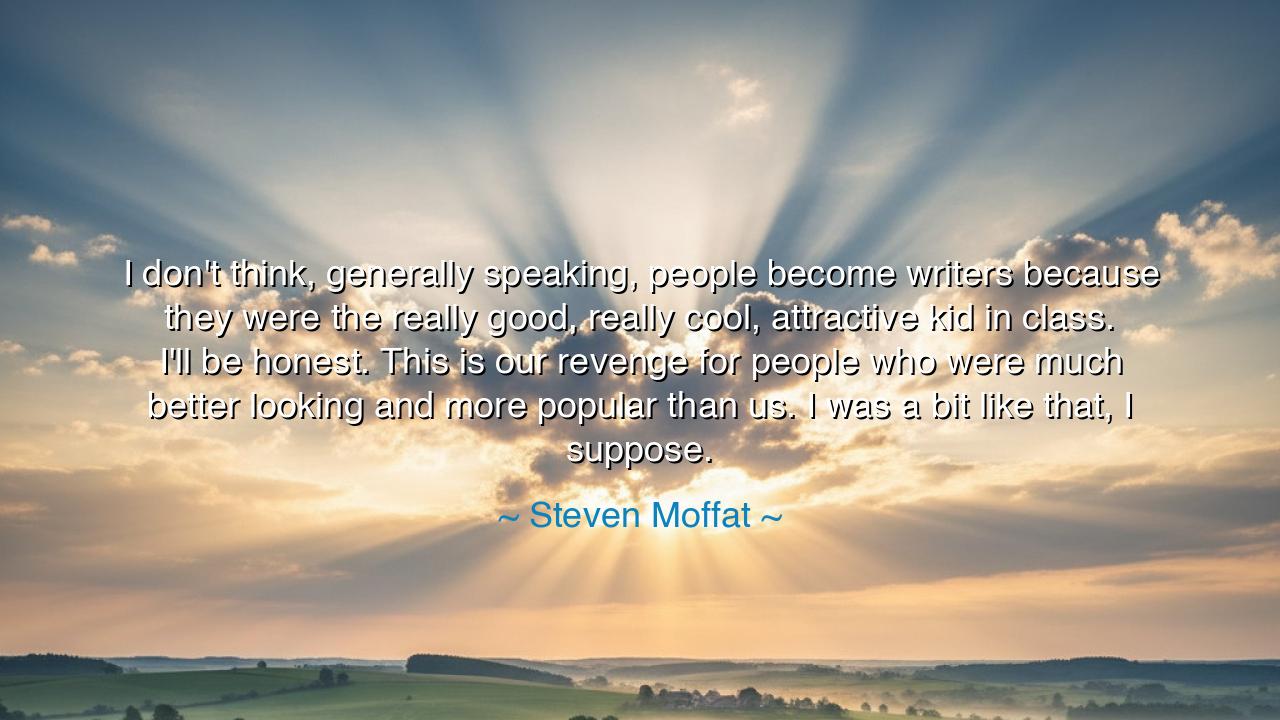
I don't think, generally speaking, people become writers because
I don't think, generally speaking, people become writers because they were the really good, really cool, attractive kid in class. I'll be honest. This is our revenge for people who were much better looking and more popular than us. I was a bit like that, I suppose.






In the quiet chambers of the soul, where dreams and desires intertwine, there often exists a hidden fire, a drive born not from privilege or popular acclaim, but from the shadows of invisibility and rejection. Steven Moffat, a masterful weaver of stories, shared a truth that strikes at the heart of the creative spirit: "I don't think, generally speaking, people become writers because they were the really good, really cool, attractive kid in class. I'll be honest. This is our revenge for people who were much better looking and more popular than us. I was a bit like that, I suppose." These words reveal a profound understanding of the creative process—a process often born from self-doubt, exclusion, and the deep desire to make sense of a world that overlooked or misunderstood.
This truth speaks not just to writers, but to all creators. The artists, the thinkers, the visionaries of the world often arise from places where they were forgotten or unnoticed by the mainstream. In the shadows of popularity and beauty, where others received praise and adoration, these creators turned inward, seeking solace and strength not in the superficial world, but in the rich depths of the mind. From this fertile ground, their creativity took root. The idea that rejection or neglect becomes the seed for creation is an ancient one, found in the stories of the great philosophers and artists of old, who often struggled in silence before their work was ever recognized.
Consider the tale of the young Socrates, who was often ridiculed for his looks and his unconventional approach to learning. He was not a man of outward beauty or charm, but a seeker of wisdom. The people around him may have dismissed him as unattractive or eccentric, yet it was in this isolation that his true genius emerged. It was not through popularity or social acceptance that he found his calling, but through his solitary reflection and the questions he asked, which stirred the hearts of those around him. His story is a testament to the power of inward strength, that the most profound ideas often come from those who have been overlooked or even dismissed by society.
In a similar vein, Vincent van Gogh, who faced rejection and solitude for much of his life, transformed his pain and alienation into art that continues to speak to generations. His brush strokes were born not from a place of social triumph, but from the depths of his heart and the sorrow of isolation. His art, which was dismissed by many in his time, became a powerful expression of the soul's ability to create beauty from suffering. It was his perceived failure in the social world that drove him deeper into his craft, and in this, he found a legacy that would outlive the world that once ignored him.
Moffat’s words speak to the humbling truth that not all greatness comes from conventional success. The greatest creators are often those who were once marginalized or misunderstood. The so-called cool kids of the world may have had the admiration of their peers, but the creative soul often flourishes in solitude, in self-reflection, and in the quiet determination to prove one's worth not to others, but to oneself. This is the revenge that Moffat speaks of: it is not the desire for retaliation, but the quiet triumph of those who create something greater than the fleeting praise of popularity.
The lesson here is one of embracing one's place in the world, no matter how small or unnoticed it may seem. The so-called outsiders, the ones who may have felt left behind or ignored, are often the ones with the deepest wells of creativity. Do not despair if you are overlooked or dismissed; rather, use that energy to fuel your own path. Seek out the places within you where the fire of creation burns, and pour that energy into your craft. Do not look for external validation, for true greatness is born from the quiet resolve to create something that speaks from the heart.
In our own lives, we can take Moffat's words to heart. Whether you are a writer, an artist, or a thinker, do not let the opinions of the world define you. Like the great creators of the past, embrace the power of solitude and the strength of your own voice. Create not to seek revenge on those who overlooked you, but to express the truths that are hidden within. In your darkest moments of rejection, remember that these are the moments from which your most powerful work may arise. It is in the quiet defiance of convention that true creativity is born.






AAdministratorAdministrator
Welcome, honored guests. Please leave a comment, we will respond soon